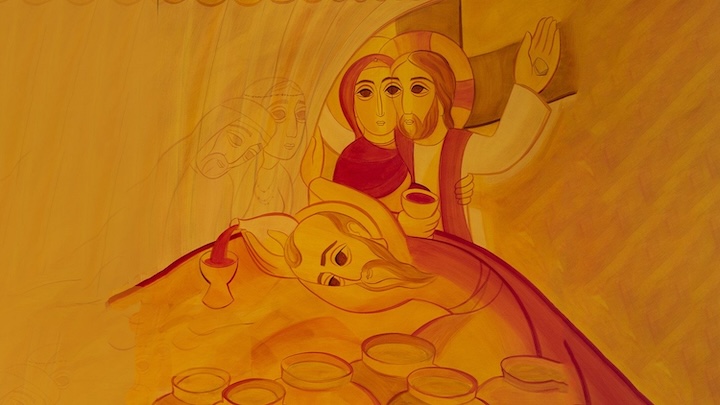Last week, the Holy See announced that Pope Francis has decided to waive the statute of limitations on allegations against the former Jesuit and celebrity artist, Fr. Marko Rupnik. Rupnik, as you may recall, has been accused by more than two dozen women of sexual, spiritual, and psychological abuse over the course of several decades. The pope’s decision to waive the statute of limitations in this case is a welcome one.
The decision to waive the statute of limitations on these allegations would have been far more welcome, however, had the decision been made much sooner, if the case up to this point had been handled with a modicum of transparency, and if the concession to justice had not needed to be, as it were, extracted from the Holy Father by an outcry of indignation and righteous anger from the faithful and especially from many victims of clerical sexual abuse.
Relating the full details of the Rupnik saga – even those particulars that are publicly known – would require more space than we have here. But even a brief account is necessary to understand how inexplicable, and how inadequate, the handling of his case has been.
The first known allegations of Rupnik’s sexual misconduct and abuse were brought to the attention of the Society of Jesus in 2018. Having been found credible, these allegations were reported to the Congregation for the Doctrine of the Faith. These allegations included the charge that Rupnik had offered absolution to an accomplice in sins against the Sixth Commandment – a grave crime that incurs the penalty of automatic excommunication.
In March of 2020, after the Jesuits determined that Rupnik had likely incurred excommunication, and after the Jesuits had sent the case to the CDF for further investigation, but before the CDF had confirmed (and subsequently lifted) that excommunication, Fr. Rupnik was invited to preach a Lenten Sermon to the pope and the Roman Curia.
A year later, in 2021, the Jesuits undertook another investigation of allegations against Rupnik from female members of his former community in Slovenia. This investigation determined there was sufficient evidence to begin a penal process against Rupnik. And, for the second time in two years, credible allegations against him were submitted to the CDF, this time with the recommendation that a penal process be undertaken.
Those allegations were submitted to the Congregation for the Doctrine of the Faith in January of 2022. That same month, Pope Francis personally met with Rupnik. A month later, new restrictions were placed upon the priest by his Jesuit superiors. In October of 2022, the CDF (since renamed the Dicastery for the Doctrine of the Faith) determined the statute of limitations had expired and no canonical process would be pursued.
Early this year, 2023, the Jesuits opened yet another internal investigation against Rupnik – by my count, the third investigation in five years. Meanwhile, Rupnik flouted the restrictions put upon him by the Jesuits. This persistent disobedience eventually led the Society of Jesus, in June of this year, to dismiss him from the order.

Which brings us to last week when it was reported that Fr. Marko Rupnik had been incardinated in the Slovenian Diocese of Koper where he, according to a statement from that diocese, “enjoys all the rights and duties of diocesan priests.”
How is it possible that a priest facing so many allegations, confirmed as credible by so many different investigations, from so many different accusers, over so many years – how is it possible that in the year 2023 anyone could think that a just resolution of such a case would be to quietly return that priest to ministry in a different location and under a new superior?
Nothing about the way this case has been handled makes any sense. It makes no sense if Rupnik is guilty; it makes no sense if he is innocent. Perhaps that’s why nobody seems interested in defending the way it has been handled. We have reached the exasperating point where bureaucratic incompetence appears the most charitable possible interpretation of events.
If there does exist a good or reasonable or even plausible explanation for the way the Rupnik case has been handled, the Vatican, as usual, shows no inclination to explain itself to anyone.
With Rome willing to say as little as possible, the message conveyed is not concern for victims, nor dedication to transparency, nor an effort to restore trust, nor a determination that justice must not only be done but be seen to be done. Rather, the message delivered (undoubtedly unintended) is of resounding contempt for the intelligence of the faithful and callous disregard for the victims of clerical sexual abuse.
The problem in all of this extends far beyond Rupnik’s own guilt or innocence, or even the need for justice and healing for those who may have suffered from his abuse. The patience of abuse survivors is being tested again and again. The trust of the faithful is being stretched ever thinner. And the obstacles to proclaiming the Gospel mount higher as the Church’s credibility erodes.
The outrage that erupted upon the news of Rupnik’s return to ministry was such that the Pontifical Commission for the Protection of Minors intervened, convincing the Holy Father to change course. Good for the Commission, and good for the pope for reversing course on the statute of limitations.
For all that, it is difficult to imagine a resolution of the Rupnik case that could undo the perception already created by this case, namely: for all Pope Francis’ highly touted efforts at reform, nothing much has changed. How can the Church credibly claim to have learned from her past failings in dealing with well-connected offenders such as Maciel and McCarrick when cases like Rupnik’s are still, inexplicably, happening today?
__________















